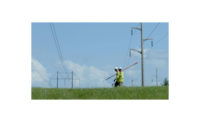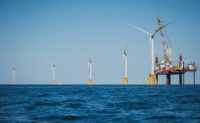Massachusetts utilities and energy officials have identified a Maine transmission project to deliver renewable energy from Quebec in case its preferred Northern Pass project doesn’t overcome a rejection from a New Hampshire siting board.
The backup plan announced on Feb. 16, designated New England Clean Energy Connect, a 145-mile power-line project that would be built by Central Maine Power Co.The Avingrid subsidiary proposed the $950 million project in a joint bid with Hydro-Québec to deliver renewable energy from Québec to the New England grid.
The state had preferred the $1.6 billion, 192-mile Northern Pass project, but that project was rejected by New Hampshire’s energy-infrastructure siting board on Feb. 1.
“Today’s decision by the Massachusetts DOER, its Independent Evaluator and the EDCs strikes a sensible balance, by allowing negotiations with Northern Pass to continue, while establishing a backup protocol that can be initiated if necessary,” a spokesman for Eversource, the Massachusetts utility behind the plan, said in a statement. The utility says it expects to file for reconsideration of the line with the New Hampshire board.
Massachusetts’ Global Warming Solutions Act, set a goal of reducing greenhouse gas emissions between 10% and 25% below 1990 statewide levels by 2020 and 80% by 2050.
In the Feb. 16 statement, a spokesman for Eversource said “we appreciate the challenge that Massachusetts officials and their electric distribution companies (EDCs) are facing as they strive to meet an aggressive goal of obtaining a new and significant source of clean energy within just a few short years. The selection of Northern Pass to deliver that energy was based in part because we can be in-service far ahead of any other project.”
Meanwhile, the Business and Industry Association of New Hampshire has endorsed the Northern Pass project and urged the New Hampshire Site Evaluation Committee to reconsider the project.
Jim Roche, the association’s president, said in a Feb. 20 news release that “New Hampshire’s electrical energy prices are consistently 50-60% higher than the national average. Approximately 30% of the region’s generation capacity has already retired or is at risk of retiring over the next few years.
“Those who claim New Hampshire can get by without Northern Pass are playing roulette with New Hampshire’s economy. Already, businesses from outside New Hampshire and others now here have reversed their plans to grow in the state due to the Site Evaluation Committee’s decision.





Post a comment to this article
Report Abusive Comment